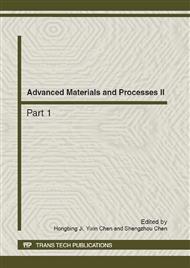p.2039
p.2045
p.2049
p.2054
p.2065
p.2070
p.2075
p.2081
p.2087
An Algorithm of Iterative Learning Control Based on Vector Plots Analysis and its Robustness
Abstract:
Abstract: In order to solve the problem of slow convergence, an iterative learning control algorithm based on vector plots analysis is proposed. By introducing the geometric principle, that angle and side length of corresponding relationship in the same triangle, and transforming output’s error relationship into the relationship of the angel, the P-type is rewarded or penalized. The new algorithm with angle-correction speeds up significantly the convergence process. For illustration, a numerical simulation is utilized to show its efficiency and superiority. Empirical results show that the new algorithm is faster than P-type to make the system convergence .The method modifying P-type by angle is entirely feasible. The system’s output converges to the desired trajectory. The new algorithm can effectively solve the slow convergence problem. Introduction
Info:
Periodical:
Pages:
2065-2069
Citation:
Online since:
July 2012
Authors:
Price:
Сopyright:
© 2012 Trans Tech Publications Ltd. All Rights Reserved
Share:
Citation:


